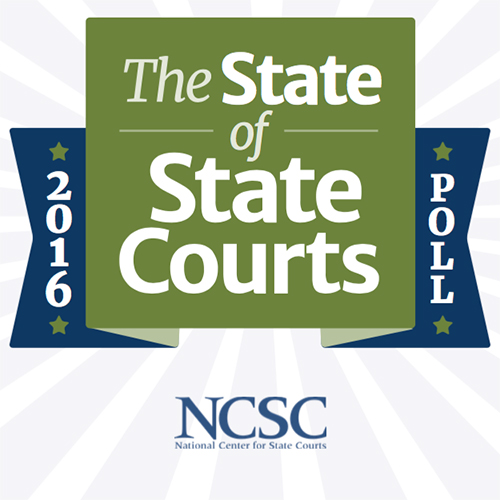Public Opinion of the Judicial Branch is Trending Upwards, New Survey Finds
 At a point when public mistrust of the government seems to be at an all-time high, a recent survey conducted by the National Center for State Courts (NCSC) shows that public opinion of at least one branch of government is trending in the right direction. This past November, the NCSC conducted a nationwide telephone survey of 1,000 registered voters to get a sense of how people feel about their state judicial system, and the results show that—despite lingering challenges—public opinion of state courts is more favorable in 2016 than it was in 2015.
At a point when public mistrust of the government seems to be at an all-time high, a recent survey conducted by the National Center for State Courts (NCSC) shows that public opinion of at least one branch of government is trending in the right direction. This past November, the NCSC conducted a nationwide telephone survey of 1,000 registered voters to get a sense of how people feel about their state judicial system, and the results show that—despite lingering challenges—public opinion of state courts is more favorable in 2016 than it was in 2015.
Many of the areas surveyed, such as public satisfaction with the court experience and public trust in the judiciary, are areas where IAALS has worked diligently to promote positive change through initiatives. According to the survey, it appears that the work of IAALS and other organizations is starting to pay off. The survey revealed that 78% of respondents felt satisfied with the fairness of their experiences with the court system. That number represents an 8% increase over responses to the same question in last year’s survey.
In addition, key areas involving public trust in the judiciary showed significant improvement over the past year. When comparing the November 2016 survey data to the same data from 2015:
- 10% more respondents reported feeling that the court system treats people with dignity and respect;
- 7% more respondents reported feeling that the court system takes the needs of people into account;
- 6% more respondents reported feeling that the court system is committed to protecting individual and civil rights;
- 4% more respondents reported feeling that the courts are unbiased in their decisions; and
- 4% more respondents reported feeling that the court system listens carefully to those appearing before them.
Survey findings are considered accurate within +/- 3.1 percent, 19 times out of 20.
The NCSC survey also revealed that most people would like to see the courts adapt and change to meet the needs of the public. This need for innovation is an area of particular importance that IAALS has promoted for years as technology continues to present opportunities to improve access to and the efficiency of the judicial system. When asked about the future of the judiciary, 52% of respondents said the court system, like any good business, needs to keep up with new innovations to better serve its constituents.
The results of the survey also show the importance of the work being done by IAALS to promote diversity on the bench and fair judicial selection processes. Of the respondents surveyed, 57% believed that judges’ ethnicity might impact the fairness of cases that come before them. With such strong perceptions, ensuring that the judiciary reflects the makeup of its citizenry remains a priority of the utmost importance.
In these tumultuous times, these figures show that our collective hard work to promote positive change in the legal system is beginning to pay off. With continued hard work, we hope to see continued improvement in the public’s confidence and faith in the judicial system for years to come.
Mark Staines is a second-year law student at the University of Denver Sturm College of Law and contributes to IAALS Online. Please direct inquiries about this post to iaals@du.edu.


